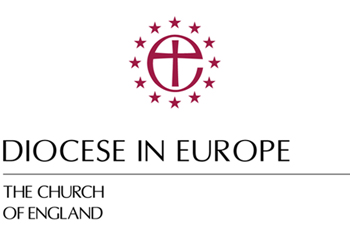Bishop Robert’s Christmas Message 2020
| The Bishop in Europe:
The Right Reverend Dr. Robert Innes |
In one of our best-loved carols, Christina Rossetti situates the birth of Jesus ‘in the bleak midwinter’. She paints a severe and freezing manger scene, with howling wind and deep snow. She represents the frosted earth and water with iron and stone.
From the biblical narrative, it seems unlikely that Jesus was born in the bleak mid-winter, as the shepherds would not be putting their sheep out to pasture in freezing conditions. But that does not stop us gladly enjoying Rossetti’s romantic poetic licence and reminding ourselves that the conditions of the first Christmas were hard, extraordinarily hard by modern standards.
Mary was a young girl giving birth a long way from home. The town of Bethlehem was crowded with strangers registering with the tax authorities of the occupying powers. Mary laid her new-born baby in an animal’s stone feeding trough. And the first visitors were not close family but rough men from the fields.
It is extremely difficult to recover this first Christmas. The festival has become overlaid with medieval nativity scenes and Romantic or Dickensian winter scenes. In the twentieth century, Christmas became the setting of the perfect family gathering. Most significantly, the run up to the commercial Christmas – the ‘golden quarter’ – is a now a vital part of the retail industry’s overall wellbeing so that vasts sums are expended on advertising to persuade us to acquire more goods and more debt.
But not in 2020. This year it will be very different. Travel bans, lockdowns and quarantines mean it will be harder and perhaps impossible to get together with our loved ones. People are poorer. High streets, at least at the time of writing, are closed in many countries. And even when they re-open, shopping isn’t quite the same when you have to physically distance and wear a mask.
Christmas will be simpler this year. And for many it will be sadder. As Covid-19 has progressed, more and more families have been affected by the virus and its frightening and sometimes long-term symptoms. Some of us have a relative who has been in intensive care, struggling to breathe. Many of us know someone who has very sadly lost their life, and some of us face the first Christmas without someone close to us. This year, perhaps we more intuitively sense the harshness of the manger scene, the cruelty of death, the pain of a bleak mid-winter.
Another well-known – and much older – carol speaks to us about ‘tidings of comfort and joy’. In 2020 we need to hear these tidings. For Christmas is at heart the story of a God who draws near to us in Jesus, sharing the sorrows and joys of human experience. In the mystery of the incarnation, the eternal God wonderfully condescends to be born as a human baby, in the roughest conditions. He is ‘Immanuel’ – the God who is with us.
Whatever conditions you face this Christmas, I hope you will be able to reach out and find the God who is with us. I hope you will take comfort from the presence of God with you, and perhaps also find opportunity to comfort others.
‘God rest you merry’ in modern English means ‘may God grant you peace and happiness’. The unknown author continued:
‘Let nothing you dismay
for Jesus Christ our Saviour was born on Christmas Day.
To save us all from Satan’s power
when we had gone astray
Which brings tidings of comfort and joy.’
I wish each of you and your families comfort and joy as we approach this Christmas season.
+Robert Gibraltar in Europe





